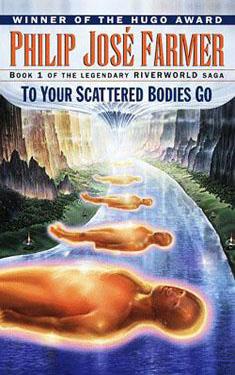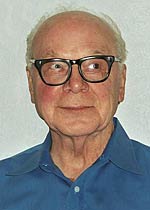GMRC Review: To Your Scattered Bodies Go by Philip José Farmer
 Guest Blogger, Allie McCarn, reviews science fiction and fantasy books on her blog Tethyan Books. She has contributed many great book reviews to WWEnd and has generously volunteered to write some periodic reviews for our blog.
Guest Blogger, Allie McCarn, reviews science fiction and fantasy books on her blog Tethyan Books. She has contributed many great book reviews to WWEnd and has generously volunteered to write some periodic reviews for our blog.
 To Your Scattered Bodies Go
To Your Scattered Bodies Go
by Philip José Farmer
Published: G.P. Putnam’s Sons, 1971
Series: Riverworld Saga Book 1
Awards: 1972 Hugo Winner,
1972 Locus SF Nominated
The Book:
”Imagine that every human who ever lived, from the earliest Neanderthals to the present, is resurrected after death on the banks of an astonishing and seemingly endless river on an unknown world. They are miraculously provided with food, but with not a clue to the possible meaning of this strange afterlife. And so billions of people from history, and before, must start living again.
Some set sail on the great river questing for the meaning of their resurrection, and to find and confront their mysterious benefactors. On this long journey, we meet Sir Richard Francis Burton… and many other [people from history], most of whom embark upon searches of their own in this huge afterlife.” ~barnesandnoble.com
This is my fourth review for WWend’s Grand Master Reading Challenge. I’d never read any of Philip José Farmer’s work before, but I’d heard of the Riverworld series. I vaguely remember watching the Sci-Fi Channel adaptation in the early 2000s, but I’m pretty sure it strayed rather far from the story of the novel.
My Thoughts:
My favorite part of To Your Scattered Bodies Go was the setting and mystery of the Riverworld. It’s admittedly a very contrived environment, but that’s acknowledged in the story. Whether it is an afterlife arranged by some deity or a grand experiment arranged by some alien race, it is clear that the Riverworld was constructed with thought towards keeping the whole of humanity in comfort. The Riverworld was also presumably constructed to serve some unknown purpose for its mysterious creator(s). I enjoyed seeing the many characters’ ideas on this central mystery, and I also had fun imagining what the purpose could possibly be. In this case, I think the mystery might be much more fascinating than any actual answer that may be eventually given.
In the Riverworld, all of humanity, from all different cultures and historical periods, live together. With so many different perspectives and life philosophies, and so many real historical figures to draw on, I think this premise has a lot of potential. Unfortunately, I don’t really feel as though the novel capitalized on this potential. For one thing, the different cultures did not seem particularly distinct. For instance, a Neanderthal man seemed surprisingly similar in views and temperament to a Victorian gentleman. I feel like it could have been a much more interesting story if it had engaged with the dramatic differences in worldview between cultures that span the whole of human history.
While the story didn’t significantly feature cultural differences, it did cast a very cynical eye toward the tendency of human beings to create conflict. In a world where everyone was set on equal ground, with no pain, illness, or shortage of resources, people began almost immediately to establish hierarchies. Despite the fact that there was plenty of food, drink, and luxuries (drugs, etc.) for all, many were quick to use force to establish inequalities in wealth and power. This seemed very realistic to me. While I don’t think hierarchical thinking is THE tragic flaw in humanity, I do think that many people pursue power for power’s sake – not just to gain control of limited resources.
Despite its fascinating central mystery, and the opportunity to use the world to explore cultural differences and human nature, To Your Scattered Bodies Go seems to be mostly a boy’s adventure story. The characters were fairly flat and not very memorable beyond the brief recognition of their historical period or real-life counterpart. Each character tended to be introduced with an awkward little infodump about their previous life. There’s also a character who seems very much like an author insertion, and who constantly spouts off facts about the hero Sir Richard Francis Burton. I felt like, with so many people to choose from, a more compelling cast could have been constructed.
 On that note, I was a little frustrated that, chosen out of all of human history, the hero and narrator was a Victorian gentleman explorer and the first villain was a Nazi, Hermann Göring. I think that, even in 1971, it must have already been a little hackneyed to use Nazis as an example of human evil and guilt. However, the situation was not quite as simple as that may make it sound, and Göring did prompt some interesting discussion of post-resurrection identity and culpability. The hero and narrator, Richard Burton, is essentially a real-life adventure hero, so I can see why he was an obvious choice for the protagonist. However, he manifested enough of the attitudes and views of the typical fictional Victorian gentleman explorer that I found him very irritating as a narrator. One of these typical attitudes is the remarkably blatant sexism that permeates the story. For a few quick examples:
On that note, I was a little frustrated that, chosen out of all of human history, the hero and narrator was a Victorian gentleman explorer and the first villain was a Nazi, Hermann Göring. I think that, even in 1971, it must have already been a little hackneyed to use Nazis as an example of human evil and guilt. However, the situation was not quite as simple as that may make it sound, and Göring did prompt some interesting discussion of post-resurrection identity and culpability. The hero and narrator, Richard Burton, is essentially a real-life adventure hero, so I can see why he was an obvious choice for the protagonist. However, he manifested enough of the attitudes and views of the typical fictional Victorian gentleman explorer that I found him very irritating as a narrator. One of these typical attitudes is the remarkably blatant sexism that permeates the story. For a few quick examples:
"She was a product of her society – like all women, she was what men had made her…”
"Even if she had been a whore, she had a right to be treated as a human being. Especially since she maintained that it was hunger that had driven her to prostitution, though he had been skeptical about that."
It seemed like Burton classified every woman he met as either a prude, a whore, or a nag, and he made it quite clear he had little interest in the women of the story outside of sex. It seemed that most of the female characters had little relevance to the story besides being sex resources for the male explorers. I know this may be a realistic representation of the attitude towards women in the 1800s, but that didn’t make it any less annoying. The narrator, the occasionally clunky writing, and the relatively flat characters dimmed my enthusiasm for the story, but I still think the novel has a really fun premise with lots of possibility for interesting stories to be told.
My Rating: 3/5
To Your Scattered Bodies Go is an adventure story set in a world that stretches along a massive river, where all of humanity is mysteriously resurrected. The novel’s strong points were the world itself and the characters’ attempts to determine its nature and purpose. The weaker points were poor characterization, lack of a strong sense of the multicultural tangle of the Riverworld, awkward writing, and the heavy dose of overt sexism brought in by the viewpoint character, a fictional version of the historical explorer Richard Burton. There were plenty of ideas to like in Farmer’s Riverworld, but, for me, they were not altogether enough to overcome the novel’s weaknesses. I am glad to have read To Your Scattered Bodies Go, but I doubt I will continue on with the rest of the series.



















 Full Details
Full Details


6 Comments
You are not the only person to feel this way about Scattered Bodies. Great premiss but not the best execution seems to be the most common litany from reviewers. Nazis are the easy, predictable and tiresome choice for the villains and, unfortunately, there seems to be no letting up on that since 1971. (I did like the Nazi zombies in Dead Snow!) It could be worse – Farmer could have used Jack the Ripper as the main baddie. That’s one trope I’d like to see go away.
Computer: Calculate Pi.
Heh. Wolf in the Fold. (I admit, I had to look up the episode title but I knew it was Trek.) Jack shows up so much there is a whole page on Wikipedia for it: http://en.wikipedia.org/wiki/Jack_the_Ripper_in_fiction
I was hoping this review would get picked when I saw it posted. I was struck by the the "boy’s adventure story" description, since this was one of my top favorite novels around age 14, and I do think it had the same sort of appeal as the Edgar Rice Burroughs novels I’d been reading a couple of years earlier, but Farmer seemed much more sophisticated from the 14-year-old boy perspective. I really loved the concept and the way that any character from history could potentially show up in the story. Makes me wonder how it would read now (not as well, apparently!). I enjoyed the second and third books in the series nearly as much, but I seem to remember it went off the rails a bit after that…
Aha, "Wolf in the Fold"! A favorite Trek-episode! Interestingly, Robert Bloch also wrote the macabre "A Toy For Juliette" more or less at the same time, which I read very recently in "Dangerous Visions." Quite a decent Jack the Ripper effort. Honestly, I would have preferred to have old Jack instead of Francis. Even in 1971 there were more compelling historical figures Farmer could have chosen. For me some of the characters could have been named anything as I could not often relate to them in terms of their historical significance. Here I found Hodder’s effort with "The Strange Affair of Spring Heeled Jack" much more satisfying. I think "Scattered Bodies" has dated badly.
@Dave: It would be kind of funny if Jack the Ripper showed up later in the series. But yeah, that one’s way overdone. Didn’t Babylon 5 even have a Jack the Ripper episode?@Scott Laz: I think I might have enjoyed it more if I’d read it when I was younger, too. The premise leaves the world open to imagine so many adventures, and the story itself is pretty exciting. I read a few reviews of the later books, and it seems like lots of people say it goes downhill in later installments.@Emil: Yeah, there’s so much from history to choose from. Someone commented on my blog that Hodder’s work made her a fan of Burton, but I haven’t yet gotten around to reading his series.
Sorry, the comment form is closed at this time.